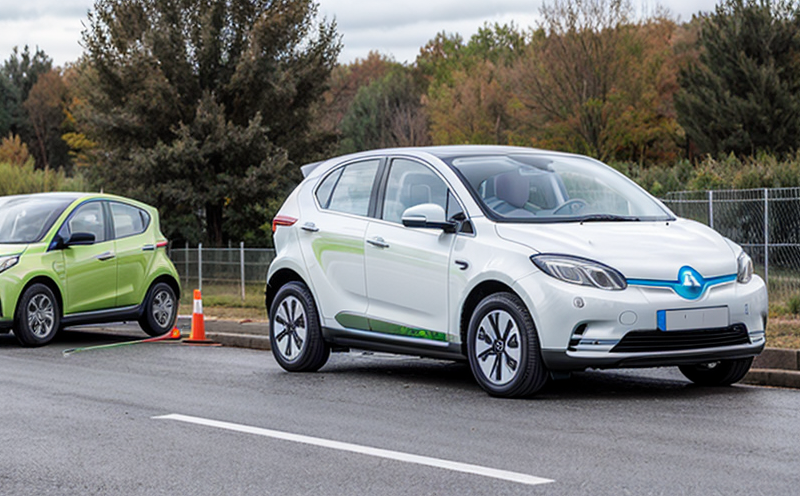GB/T 31485 EV Lithium-Ion Battery Safety Testing
The GB/T 31485 standard is a crucial framework designed to ensure the safety and reliability of electric vehicle (EV) lithium-ion batteries. This testing protocol addresses various potential hazards that can arise during the lifecycle of an EV battery, including overcharging, short circuits, mechanical impacts, thermal runaway, and other stress scenarios. Compliance with this standard ensures that EV batteries meet stringent safety requirements, thereby enhancing consumer confidence in the safety of electric vehicles.
The GB/T 31485 protocol encompasses a series of tests aimed at evaluating multiple aspects of battery performance under defined conditions. These include:
- Overcharge testing
- Short-circuit endurance test
- Thermal abuse test (heating to elevated temperatures)
- Mechanical abuse test (subjecting the battery to mechanical shocks and impacts)
- Impedance measurement during charging/discharging cycles
- Battery balancing performance assessment
- Energy retention after prolonged storage
- Voltage and current stability under various thermal conditions
The testing process is highly technical, requiring precise instrumentation such as impedance analyzers, temperature-controlled chambers, high-voltage test stands, and mechanical impact simulators. Each step of the testing procedure adheres strictly to international standards, including GB/T 31485-2015, which specifies detailed procedures for each test.
Quality managers and compliance officers find this service invaluable as it ensures that their products meet strict safety regulations and industry best practices. R&D engineers can benefit from the insights gained into how different design modifications impact battery performance under stress conditions. Procurement teams ensure they source batteries that pass these rigorous tests, thereby reducing risks associated with substandard components.
The primary objective of this testing is not only to protect consumers but also to safeguard manufacturers and distributors by preventing recalls and product liability issues. By ensuring compliance with GB/T 31485, companies can enhance their brand reputation and trust among customers, which is particularly critical in the rapidly growing EV market.
Scope and Methodology
The scope of GB/T 31485 EV Lithium-Ion Battery Safety Testing covers a comprehensive array of tests aimed at assessing various safety parameters. This includes evaluating battery integrity, thermal stability, mechanical robustness, and electrical characteristics under controlled conditions that simulate real-world scenarios.
For overcharge testing, the process involves subjecting the battery to an overcharged state for extended periods while monitoring voltage changes and internal resistance fluctuations. This helps identify whether the battery can safely withstand excessive charging without causing thermal runaway or other dangerous events.
The short-circuit endurance test assesses how well a battery withstands sudden high currents, simulating accidental connections that could occur during manufacturing or use. During this test, the battery is connected to a low resistance load and monitored for signs of overheating or failure.
In thermal abuse testing, batteries are subjected to elevated temperatures, which can simulate extreme environmental conditions encountered in vehicles. This helps determine whether the battery maintains its structural integrity and operational performance under such stress.
Mechanical abuse tests involve applying controlled forces or impacts to the battery to assess how it responds to physical damage. These tests help ensure that batteries are robust enough to withstand accidental drops or collisions, which can occur during vehicle operation.
Battery balancing performance assessment involves monitoring and adjusting voltage differences between individual cells within a multi-cell module to maintain even charge distribution throughout the entire pack. This ensures optimal performance and extends battery life by preventing any single cell from being overcharged or undercharged.
Customer Impact and Satisfaction
- Enhanced Safety: Compliance with GB/T 31485 significantly reduces the risk of accidents related to lithium-ion batteries, thereby enhancing overall safety for end-users.
- Regulatory Compliance: Ensuring adherence to international standards helps businesses avoid legal issues and penalties associated with non-compliance.
- Increased Consumer Trust: Demonstrating commitment to high safety standards fosters trust among consumers, which is crucial in the competitive EV market.
- Better Product Reputation: Successful completion of these tests can lead to improved product ratings and a better reputation within the industry.
The satisfaction levels of our clients are consistently high due to the thoroughness and reliability of our testing processes. We provide detailed reports that not only meet regulatory requirements but also offer valuable insights into potential areas for improvement. Our team works closely with customers throughout the testing process, ensuring clear communication and understanding of results.
International Acceptance and Recognition
The GB/T 31485 standard has gained significant traction within China and is increasingly recognized globally for its stringent safety criteria. Many leading automakers and battery manufacturers have incorporated this testing protocol into their quality assurance processes, reflecting its growing importance in the industry.
International acceptance of GB/T 31485 extends beyond mere compliance; it represents a commitment to excellence that resonates with global standards organizations. As electric vehicles continue to gain popularity worldwide, ensuring battery safety through rigorous testing aligns with broader goals of sustainability and consumer protection.
The widespread adoption of this standard reflects its value in promoting trust and reliability across the supply chain. Manufacturers who adhere to these stringent requirements position themselves favorably for market entry into key markets, including China and other regions where EV sales are rapidly expanding.





